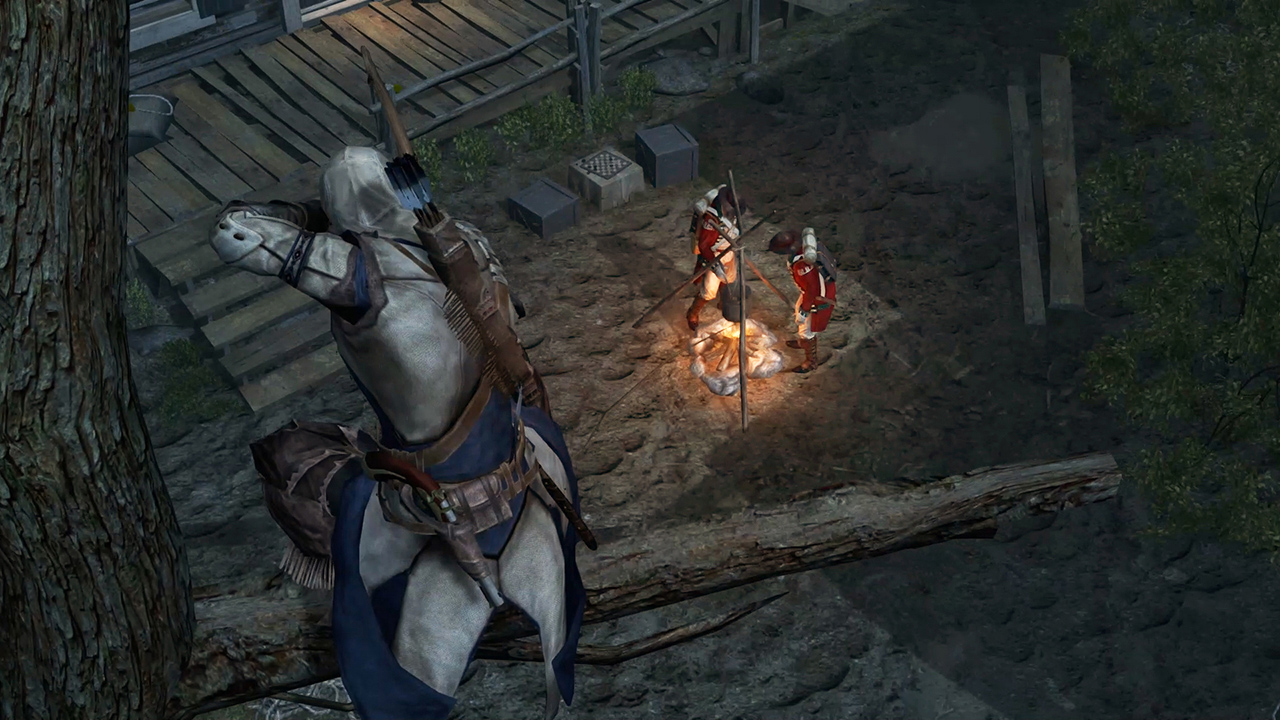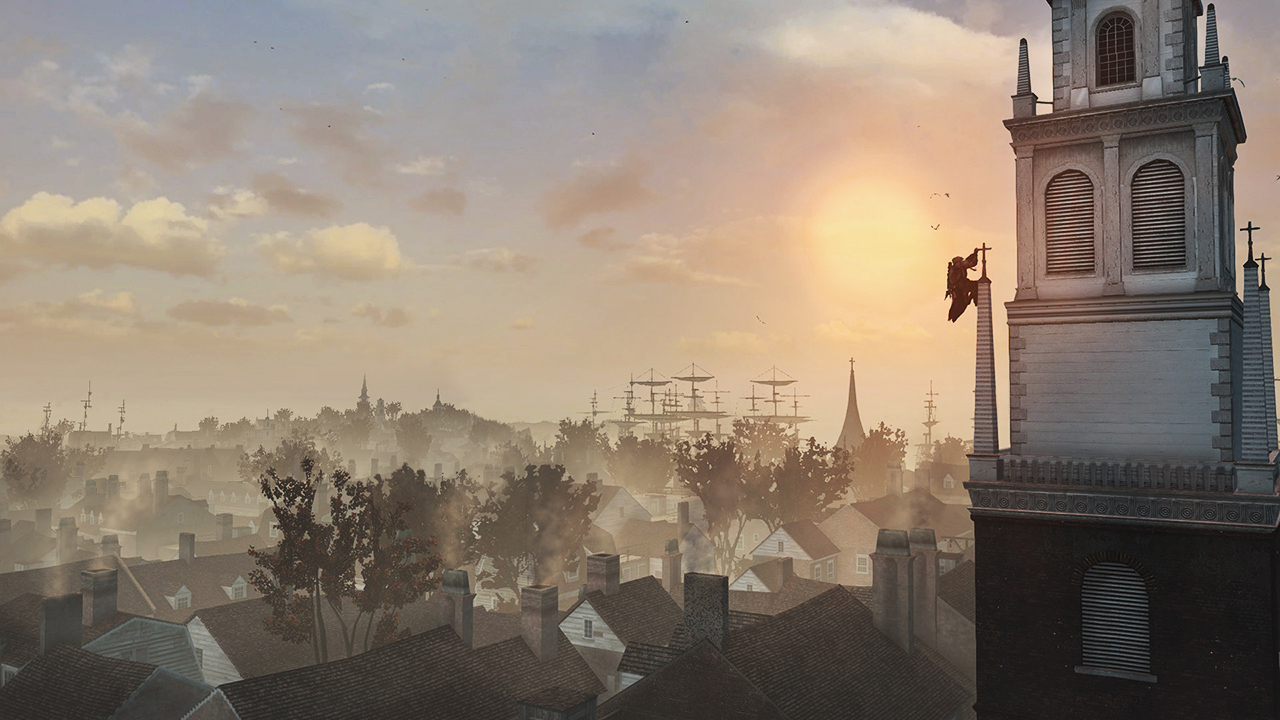System: Switch
Release date: May 21, 2019
Developer: Ubisoft
Publisher: Ubisoft
Do you remember your first experience with Assassins Creed? The inaugural entry in Ubisoft’s hit series was a driving force of the Xbox 360 and PS3’s launch – a bold new idea with ample room to innovate and expand over the course of a generation. Since then we’ve sliced and swan-dived our way through key moments in history, with a personal highlight being the swashbuckling antics of Assassins Creed IV: Black Flag. We’ve also seen a near complete shift in the franchise’s framework with recent entries Assassin’s Creed Origins and Assassin’s Creed Odyssey, which renewed interest considerably for current-gen console owners. With such a wide ranging suite of ideas, concepts and executions at hand, it strikes me as odd that Ubisoft have chosen to bring such a divisive snapshot of the series’ history to the Switch.
When Assassins Creed III originally launched back in 2012, critics praised its keen attempt at telling a more personal story within that universe. They also highlighted the quality of life improvements evident in the game. Free-running was now smoother and more contextual (requiring only a single held button to execute most maneuvers) and combat was more cinematic and responsive. A fair amount of criticism was leveled at legacy issues present in the game’s design however, with stiff and linear missions, a glacially paced story, and side activities that often felt like eating too much candy hampering the experience considerably.
In 2019 then, all of those assessments still hold true. The only difference now being that the negatives stand out even more profusely, and the novelty that once cradled any positive aspects to the game has been lost to time. Assassins Creed III feels like an awkwardly executed relic, and one that’s dated in the least endearing way possible. Animations are clunky, the world simulation feels skin deep, and as mentioned before the story missions are linear to the point of monotony. Sure, there’s an exciting backdrop in colonial America, but it’s one plagued by wonky AI and rigid mechanics. Side missions can be a fun diversion once or twice, but when the same activity consistently across the map, it loses any and all appeal at a rapid pace. These are common complaints for open world Ubisoft games from this era, and seven years on from its original release, Assassin’s Creed III feels like a Dummy’s Guide – “How To Absolutely Not Engage Your Player”.
The game’s story is a really good example of how ill-fitting this package is overall. It had been a minute since I’d played any of the older Assassins Creed games, but I still got the gist of the plot for the most part. Having said that, most of the segments set in the current day completely bewildered me, with characters spitting out callbacks and references to all manner of events predating this game and leaving me completely in the dark. A lot of the bigger story beats simply ended up lacking in weight and significance for me. I imagine if you have recently played all of the earlier entries in the series this won’t happen to you, but that seems like a very substantial time investment for such an expansive franchise. Thankfully, I had an easier time following the events surrounding Connor, the game’s protagonist. There’s a significant twist towards the beginning of the game that shifts your perspective on heroes and villains quite creatively, but beyond that there is a lot of filler throughout the main story. Characters come and go seemingly at random, and at points it almost feels like the writers forgot that they were working on an open world game, focusing instead on awkwardly inserting Connor into key moments in American history – to hell with the narrative dissonance.
Speaking of open world, it’s a Ubisoft game. That means a lot of towers, a lot of eagle cries, and a lot of jumping into haystacks. It’s all here – hunting, collecting pages, helping townsfolk with menial tasks – it’s all very 2012 in its sandbox. I remember feeling rather worn out on a lot of these trappings back in the day, and Assassins Creed III is a nice reminder of why that was. It’s painfully repetitive in its execution, and none of the game’s mechanics have aged well enough to merit engaging with them for any substantial amount of time. Combat is cumbersome and muddy through a modern lens, with a simple attack, parry, and counter system serving as the meat of every enemy encounter, and free-running somehow manages to be slow and twitchy simultaneously, a bewildering achievement that is guaranteed to cause headaches.
Unfortunately, the headaches don’t end there, as the game’s performance on Switch leaves an awful lot to be desired. Not only does Assassins Creed III miss out on the engine and lighting upgrades that other versions have been treated to, but the frame ate is both lower and more inconsistent than those found on other platforms. Urban areas bring the game to an absolute crawl in both docked and portable play, and the already floaty combat has several nails added to its coffin thanks to a variable stutter that permeates most of the experience. Not only that, but audio quality is miserable, and it’s uncomfortably noticeable from the moment you boot the game up. This is further impacted by an excruciating bug that sees any and all audio crackling and beeping through the speakers whenever there is a transition between cutscene and game (of which there are a lot).
I suppose that’s where Assassin’s Creed Liberation comes in. Originally released on the PS Vita, Liberation is a spin-off title revolving around a separate female protagonist, Aveline, and is packed into this remaster as a kind of value add-on. The amount of value it adds is up for serious deliberation though. After spending over 40 hours with a disappointing port of a dated game, I apprehensively waded my way through Liberation’s shorter campaign and was left utterly nonplussed. Same problems, different map.
The Verdict

This review originally began with a joke about Assassins Creed III being yet another port arriving on the Switch, whilst also being a game that contains a lot of actual ports in its depiction of colonial America. I quickly realized how dated and confusing it would be to do such a thing, but that also happens to be a solid description of Assassin’s Creed III on Switch, especially in its current state. With substantial work on its core mechanics and some much needed polish this could have been an admirable addition to the Switch’s growing lineup of ports. Unfortunately, it falls flat at the very first hurdle in failing to do the series justice. It feels less of a remaster, and more of a demake.
Assassins Creed III Remastered review copy provided by Ubisoft for the purposes of this review.


